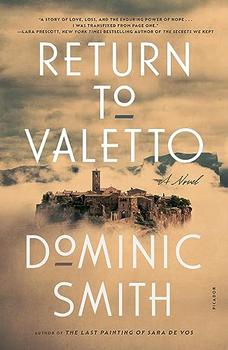Summary | Excerpt | Reviews | Beyond the Book | Readalikes | Genres & Themes | Author Bio

A Novel
by Dominic Smith1
The Saint's Staircase hangs down from the cliffs of Valetto, spiraling into thin air. It's all that remains of the house in Umbria where a disciple of St. Francis of Assisi lived until 1695, when a massive earthquake cleaved a third of the town into the canyons below. Because Valetto sits on a pedestal of volcanic rock—an island jutting up from the valley floor—the spiral staircase appears to float, a twist of wrought iron eerily suspended between the chestnut groves below and the twelfth-century church spire above.
Over the centuries, as Valetto has dwindled from a town of three thousand to just ten full-time residents, including my mother's family, the staircase has become a favorite spot for reckless tourists and ruminating locals. Some have claimed otherworldly vistas from the stairs: apparitions of the medieval saint or visitations from the dead. As a boy, when I visited the town during the summers, I'd get up early to see the fog rolling up the riverine mouth of the valley, and climb down onto the bottom lip of the stairwell so I could stand sheathed inside a cloud for fifteen minutes, watching my hands slowly disappear at the railing.
But then one morning, as I descended, my throat thickened with dread as an enormous figure loomed toward me through the haze. And that feeling returned over the years. It came for me on suspension bridges and high rooftops, in an elevator stuck between floors, and in the waiting rooms of hospitals. I'd find myself descending through that fog, halfway down the stairs and filling with dread before I reminded myself that it was all a trick of light and perspective, that it wasn't real. So many times, I told myself that figure must have been simply a shaft of early sunlight glinting down the aperture of the narrow valley, projecting and refracting my silhouette into a cloud of vapor. Still, I avoided the stairwell until one harrowing November night nearly four decades later.
* * *
I specialize in abandonment. This had always been my quip at academic conferences and faculty gatherings, but it wasn't until I published a book about vanishing Italian towns and villages that people realized how serious I was. Famous for Dying: A Social History of Abandoned Italy was well reviewed in the journals and sparked a series of invitations from universities in Rome, Milan, and Turin. And so, after a two-year absence, I found myself preparing to return to Italy for six months in the autumn of 2011.
Between conference panels and guest lectures, I intended to revisit some of the places where I'd done my research over the course of many summers. From Craco in the south, to the hillsides of Umbria and northern Piedmont, I'd walked along empty cobblestone streets and overgrown trails, taking photographs and interviewing current and former residents, including my aunts and my grandmother. Sometimes there was a single holdout, like the hermit in Abruzzo who'd lived in a deconsecrated church for twenty-five years, and sometimes there were a few families left, or no one at all. And although the towns and villages all had their own abandonment stories—landslides, earthquakes, the ravages of time and urbanization—there was always somebody who dreamed of a comeback, a return. That hope, however naïve, is perhaps what drew me to these desolate places to begin with: the heroic idea of going up against history.
On my college campus in Michigan, my "desolation book project" was celebrated as its own comeback of sorts. I'd lost my wife and mother within a four-year span, and so it was said I'd written an important social history from the crucible of my own grief. Just before I flew to Rome, the dean of liberal arts, a Beowulf specialist who spoke some Italian, hosted a small going-away party for me and gave a toast that ended with in bocca al lupo!, into the mouth of the wolf! Technically, this means good luck in Italian, but leaving his mouth it took on an Anglo-Saxon menace—violent and foreboding—as if he were rallying me into the carnivorous maw of the future, as if he knew that something was waiting to swallow me whole.
Excerpted from Return to Valetto by Dominic Smith. Copyright © 2023 by Dominic Smith. Excerpted by permission of Farrar, Straus & Giroux. All rights reserved. No part of this excerpt may be reproduced or reprinted without permission in writing from the publisher.
We've heard that a million monkeys at a million keyboards could produce the complete works of Shakespeare...
Click Here to find out who said this, as well as discovering other famous literary quotes!
Your guide toexceptional books
BookBrowse seeks out and recommends the best in contemporary fiction and nonfiction—books that not only engage and entertain but also deepen our understanding of ourselves and the world around us.